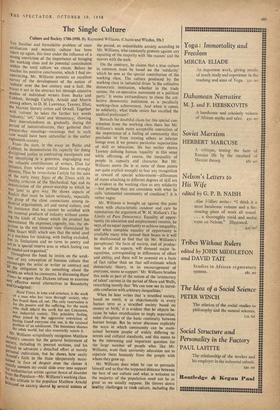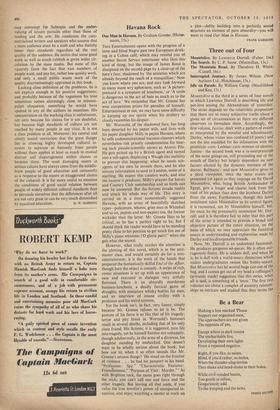The Single Culture
Culture and Society 1780-1950. By Raymond Williams. (Chatto and Windus, 30s.)
THE familiar and formidable problem of mass civilisation and minority culture has been taken up again, this time under the influence of a strong conviction of the importance of bringing the working class and its potential contribution within the total culture we create. Before he reaches his positive conclusions, which I find un- convincing, Mr. Williams presents an excellent survey of the development of the notion of culture' over the last century and a half. He traces it not in the abstract but through attentive studies of individual writers from Burke and Cobbett, through Carlyle, Arnold and Morris among others, to D. H. Lawrence, Tawney, Eliot, the Marxist literary critics and Orwell. Together with `culture' he takes the further key words 'industry,' art,"class' and democracy,' showing their interrelatedness as, gradually, during the period of industrialisation, they gathered their present-day meanings—meanings that in each case would have been unfamiliar in the earlier eighteenth century.
From the start, in the essay on Burke and Cobbett, he demonstrates his capacity for doing disciplined justice to contrasting standpoints and for identifying in a generous, ungrudging way the valuable contributions of writers, Eliot for instance, from whose central theme he strongly dissents. Thus he resuscitates Carlyle for the sake
its healthy the early essay Signs of the Times with ts healthy criticism of the Mechanical Age and its denunciation of the power-worship to which he was later to give way. He shows aspects of Ruskin that must be taken seriously, especially his grasp of the close connections among in- dustrial organisation, art and moral culture, and his insistence that we cannot be satisfied with the material products of industry without assess- ing the kinds of labour which the product has necessitated. He expresses, cogently, too, the ob- jection to the not unusual view (formulated by John Stuart Mill) which sees that the mind used as a machine for thinking, with feeling excluded, has its limitations and so turns to poetry and art as 'a special reserve area in which feeling can be tended and organised.' Throughout the book he insists on the weak- ness of any conception of humane culture that encourages the artist or writer to contract out 61 the obligation to do something about the society on which he comments. In discussing Hard he argues that Dickens refuses to examine any effective social alternatives to Bounderby and Gradgrind : Hard Times, in tone and structure, is the work of a man who has 'seen through' society, who has found them all out. The only reservation is for the passive and the suffering, for the meek who shall inherit the earth but not Coketown, not industrial society. This primitive feeling, When joined by the aggressive conviction of having found everyone else out, is the retained position of 'an adolescent. The innocence shames the adult world, but also essentially rejects it. Mr. Williams scrupulously recognises Matthew Arnold's concern for the general betterment of society, including its poorest sections, and his — refu1 to advocate a detached effort at merely Personal cultivation, but he shows how easily cunold's faith in the State (desperately main- ained in face of despair over the classes it mainly consists in) could slide over into support for authoritarian action against threat of disorder :vont the Populace—Mr. Williams's working class. In this attitude to the populace Matthew Arnold oetrayed an anxiety shared by several writers of
the period, an unjustifiable anxiety according to Mr. Williams, who constantly protests against any equating of the majority with 'the masses' and the masses with the mob.
On the contrary, he claims that a true culture in common must be based on the 'solidarity' which he sees as the special contribution of the working class. The culture produced by the working class in industrial times 'is the collective democratic institution, whether in the trade unions, the co-operative movement or a political party.' It seems extraordinary to claim the col- lective democratic institution as a peculiarly working-class achievement. And when it comes to solidarity, what trade union has excelled the medical profession?
Beneath the doubtful claim for this special con- tribution from the working class there lies Mr. Williams's much more acceptable conviction of the importance of a feeling of community that precludes us from treating others as inferior beings even if we possess particular superiorities of skill or education. He has earlier shown Tawney defining human 'equality' in this sense while affirming, of course, the inequality of people in capacity and character. But Mr. Williams seems (he is at some of these points not quite explicit enough) to fear any recognition or reward of special achievement—differences of status attaching to different degrees of skill are as evident in the working class as any solidarity —but perhaps they are consistent with what he calls 'substantial community of condition'? It is rather vague.
Mr. Williams is brought up against this point when with characteristic candour and care he summarises the argument.of W. H. Mallock's The Limits of Pure Democracy. Equality of oppor- tunity (in education and employment) consists, he says, of an equal opportunity to achieve inequality, and when complete equality of opportunity is available many who pinned their hopes to it will be disillusioned to find that (in Mr. Williams's paraphrase) 'the facts of society, and of produc- tion in all its aspects, will demand major in- equalities, corresponding to differences of effort and ability, and these will be assessed on a basis of fact rather than on that self-estimate which democratic theory, in its encouragement of everyone, seems to support.' Mr. Williams brushes this aside as part of the notion of the 'aristocracy of talent' current in the period of Shaw and Wells, remarking merely that 'We can now see its inevit- able confusion with arbitrary inequalities.'
When he later writes that 'a stratified society, based on merit, is as objectionable in every human term as a stratified society based on money or birth,' it is evident that he objects be- cause he takes stratification to imply separation, some disruption of the basic continuity between human beings. But he never discusses explicitly the ways in which community can be main- tained between people of widely differing in- terests and cultural standards, and this seems to be the interesting and important question for the large number of people who, like Mr. Williams, want their university education not to separate them humanly from the people with whom they grew up.
Mr. Williams does what he can to persuade himself and us that the supposed distance between the best of our culture and what is welcome to the majority of the population need not be as great as we usually suppose. He throws down healthy challenges to snob culture, including the
easy contempt for Subtopia and the under- valuing of leisure pursuits other than those of reading and the arts. He condemns the corn- mercialised writers and speakers who assume that a mass audience must be a mob and who thereby lower their standards regardless of the real quality of the audience. He insists that some good work as well as much rubbish is given wider cir- culation by the mass media. But none of this squarely faces the fact that vast numbers of people want, and pay for, rather low-quality work, and only a small public wants work of the quality discriminatingly appraised in this book.
Lacking close definition of the problems, he is not explicit enough in his positive suggestions; and probably because of the vagueness his tone sometimes comes alarmingly close to mission- pulpit eloquence, something he would have spotted in any of the authors he examines. His concentration on the working class is unfortunate, not only because his claims for it are doubtful, but because high standards of culture are not reached by many people in any class. It is not a class problem at all. Moreover, his central and utterly sound conviction that the great danger lies in allowing highly developed cultural in- terests to separate us humanly from people without them applies at least as much to mutual distrust and disparagement within classes as between them. The most damaging sneers at serious culture have always come from the middle- brow people of good education and commonly as a response to the sneers or exaggerated claims of the cultured. It is far more useful to examine the conditions of good social relation between people of widely different cultural standards than to persuade ourselves that the differences after all are not very great or can be very much diminished



































 Previous page
Previous page